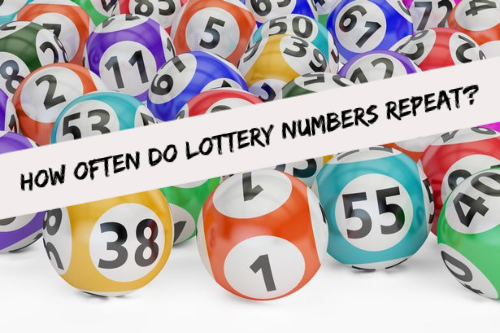How Often Do Lottery Numbers Repeat?

Ah, the mystery of lottery drawings and lottery numbers! We all try to make sense of the situation; we work hard to improve our odds of winning a prize. This desire pushes us to seek patterns and opportunities to come on top of the system and beat the impossible statistical odds.
Many lottery players wonder about the frequency of winning numbers repeating themselves. How often do such statistical anomalies happen? Is it possible for an entire winning combination of five or six digits to be drawn again in the future?
Theoretically, that’s a viable possibility, and nobody can predict how often lottery numbers will repeat themselves. In reality, there have been some curious instances that we will take a more in-depth look at today.
Can you play Gosloto 749 outside Russia?
Do Winning Numbers Repeat at All?
Yes, lottery-winning numbers repeat. The frequency of this happening, however, cannot be predicted.
Mathematicians have been so interested in the question that some have even attempted to establish the amount of time that can pass between drawings that feature repeat winning numbers.
One mathematician found out that no more than 78 consecutive drawings can take place without a pair of winning numbers repeating. This holds very little important information for players. For a start, who’s going to count 78 drawings? Also, a repeat pair is not enough to ensure a massive payout.
The Mathematical Explanation
It all boils down to statistics.
Each drawing starts with the same set of numbers. This means that the numbers drawn during one drawing have an equal chance of being drawn again in the next edition of the lottery.
Think about a dice. It only has six sides, which means that the odds of getting repeat numbers are better than the odds of winning the lottery. It’s possible for a player to roll a five, followed by a five, followed by another five.
Lottery games follow the same mathematical principle. A 25 drawn during one week has the same odds of being drawn the next week again.
While some have observed hot and cold lottery numbers (those that are bound to get drawn most often and least often), nobody can predict exactly when a hot number is going to appear among the winning digits again. This creates a level playing field, and nobody has better odds than somebody else, even if they rely on a system.
Ok, How About Repeat Lottery Numbers in Real Life?
There have been multiple instances in real life that demonstrate the statistical principle and show that everything could happen.
In 2009, Bulgaria’s Sports Toto experienced a curious occurrence.
The game of 6/49 saw the same numbers being drawn twice over one week. The two consecutive drawings featured the winning combination of 4, 15, 23, 24, 35, and 43.
People quickly started gossiping and circulating rumors about the lottery being rigged (wouldn’t you under the same circumstances?).
Statisticians believe this is a fantastic coincidence, and as it turns out, nobody benefited from the repetition in the winning sequence. But the reaction is quite natural, and similar responses have occurred in other parts of the world when unusual numerical sequences are drawn or winning numbers repeat themselves.
In 2010, something quite similar happened in Israel.
The occurrence wasn’t as striking as the Bulgarian example, but obviously, it benefited a more significant number of people.
On October 18, lottery officials chose the winning numbers 13, 14, 26, 32, 33, 36, and a Strong Number of 2. People quickly noticed that the numerical combination was exactly the same as the one drawn on September 21.
Once again, Israeli media received dozens of calls from disgruntled people who complained about the lottery being rigged. There were some reasons for lottery players to be suspicious. The October 18 drawing had three people guessing the entire numerical combination correctly and 92 people having a combination of six correct numbers. The three lucky winners each took home 1.116 million dollars. Those who matched six numbers received individual awards of anywhere between 1,110 and 1,830 dollars.
Officials from the lottery denied the allegations of the drawing being rigged to benefit anyone. The occurrence was labeled a remarkable coincidence, but this did little to appease the crowd.
The lottery even took it to the next step to examine the machines and the balls being used in the drawings. No irregularities were found, and statisticians concluded that while rare, such mathematical curiosities could occur every once in a while. A university professor went ahead to calculate how often such unusual events could take place. His calculations showed that what happened in the Israeli lottery was something that could occur with the frequency of once every 10,000 years!
Even games characterized by impossible odds have seen the repetition of winning numbers. In the history of Powerball, two combinations have been repeated in the same sequence. The winning numbers 2, 13, 20, 21, and 23 have been drawn twice. The same applies to 1, 5, 25,63, and 67. This isn’t the entire winning combination, and there has been a long period between the two drawings. The information isn’t that beneficial for players, but it does show that real-life events can quite often beat the impossible statistical odds of the mathematical world.
There are theories that absolute randomness cannot be guaranteed in lottery drawings. Some believe that the machines used, and glitches in the system make certain numbers more likely to be drawn than others. No matter what you believe, the lottery is still a game of luck. Even if you believe that a specific winning combination will show up again, you can’t tell when or how this is going to happen. Thus, you should play the lottery for fun and hope for the best as systems aimed at beating the odds will most probably disappoint you.

Marry Levental is a writer and content contributor at LotteryPros with a genuine passion for both lotteries and storytelling. Known for her energetic writing style and attention to player concerns, Marry covers everything from platform reviews to industry news with clarity and heart. She brings a balanced perspective to her articles, always aiming to help readers make informed, confident decisions. Her enthusiasm for the lottery world is evident in every piece she writes.